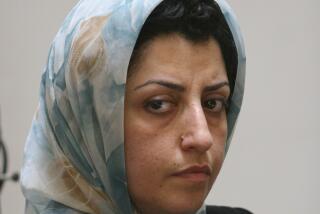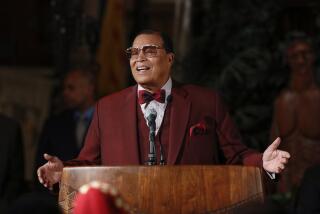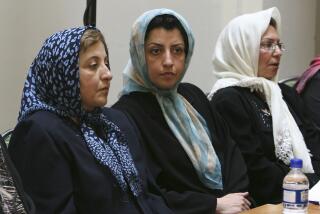Farrakhan Accepts Award--but Not Cash
- Share via
TRIPOLI, Libya — Nation of Islam leader Louis Farrakhan on Friday proclaimed himself honored to accept a human rights award named for Libyan ruler Moammar Kadafi but turned down its accompanying $250,000 prize to avoid legal problems in the United States.
Standing before emotional supporters who cried “Victory!” and “God is great!” Farrakhan--the gold-medal prize hanging from a sash around his neck--also launched a withering attack on America’s human rights record and said it was his religious right and duty as a Muslim to accept charity from a fellow Muslim.
He accused the U.S. government of trying to brand him as a “pariah,” just as it had done to Kadafi. He promised the “mother of all court battles” to ensure that he eventually gets his prize money, which he said he would use to benefit African Americans.
The leader of the Chicago-based African American Muslim movement used the award ceremony here in the Libyan capital to back Kadafi, his longtime friend and benefactor. He offered a broad condemnation of U.S. policies that he said have labeled several Islamic nations as rogue states.
“I commend Moammar Kadafi as one who gives to the human rights struggle of oppressed people,” Farrakhan said. “Regardless of what the West thinks of Moammar Kadafi, Moammar Kadafi is my friend and he is my brother. I shall never denounce him or deny him to please an enemy.”
In general terms, Farrakhan also denounced terrorism, saying, “I would ask for a moratorium on all acts of terrorism that take the lives of innocent human beings for political purposes.”
Libya--along with Syria, Iran and Sudan--is one of several nations in this region identified by the State Department as sponsors of international terrorism.
Although the Libyan strongman did not attend Friday’s ceremony, Farrakhan, as winner of the Moammar Kadafi International Human Rights Award, was scheduled to meet him today. Farrakhan, organizers here said, won the award for organizing last October’s Million Man March, which brought hundreds of thousands of African American men to Washington in a “day of atonement and responsibility.”
The prize was conferred as part of larger celebrations here of the 27th anniversary of the military coup that brought Kadafi to power and allowed him to impose his philosophy of “Islamic patriotic socialism” on this oil-rich North African country.
But the U.S. Treasury Department put a damper on Farrakhan’s hopes of collecting his prize, warning him it would be illegal for him to accept that sum, as well as $1 billion offered earlier by Kadafi. U.S. officials said his receipt of the money would violate sanctions imposed against Libya for its failure to turn over two suspects in the bombing of Pan American Flight 103 over Lockerbie, Scotland, in 1988.
Farrakhan, however, defended accepting the prize, asserting it had “no attachment whatsoever to the government of Libya. As a Muslim, I should be free to offer words of comfort to those who are suffering under sanctions and embargoes in Libya, in Iran, in Iraq or even non-Muslims in Cuba. The government of the United States has no right to tell Libya or this committee that they should not give charity in accord with our religious principles.”
When Farrakhan shouted in his deep baritone, “As a Muslim, I must not fear anyone but God,” many people in the audience rose and shook their fists in apparent agreement. “I do not include the government of America as a god!” he added.
But the audience seemed subdued, almost puzzled, when Farrakhan praised America’s founding principles as spelled out in the Declaration of Independence, the Constitution and Bill of Rights. He also called America “the flower of democratic societies.” He noted that, in America, citizens are free to challenge the government in court.
*
While expressing sympathy for families of those killed on Pan Am Flight 103, he said America, before branding other countries as terrorist nations, should devise a universal definition for terrorism and hold its own activities overseas to that standard.
Since his arrival Wednesday night, Farrakhan has been treated like a visiting head of state by his Libyan hosts. His face has appeared on the front page of every newspaper, his comments played and replayed repeatedly by state television. He and his entourage are staying in a five-star hotel overlooking the Mediterranean, guarded by battalions of plainclothes police.
More to Read
Sign up for Essential California
The most important California stories and recommendations in your inbox every morning.
You may occasionally receive promotional content from the Los Angeles Times.













